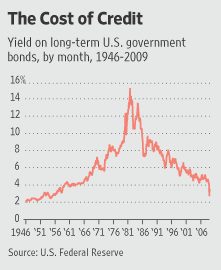"The forces of the market are just that: They are forces; they are like the wind and the tides; they are things that if you want to try to ignore them, you ignore them at your peril, and ... if you find a way of ordering your life that is compatible with these forces, indeed which harnesses these forces to the benefit of your society, that's the way to go." -- Arnold Harberger, University of Chicago Economist
Saturday, February 28, 2009
Tax Rates of the Rich and Poor
In light of the current administration's decision to increase taxes on the "wealthy" we should ask how much tax the "wealthy" are paying now relative to less wealthy people. The answer may surprise you.
Friday, February 27, 2009
Wednesday, February 25, 2009
Tuesday, February 24, 2009
How the GOP Should Approach TARP 2.0
"The grave threat of the next TARP is that it will set in motion a downward spiral, beginning with government-imposed conditions diminishing corporate profitability, which in turn could necessitate another injection of taxpayer money, along with further government conditions. This, on top of the vast sums of nonstimulative spending just enacted, will be a drag on economic growth. It's a slippery slope that Republicans must oppose from the outset."
A Fatal Trajectory
I am not as pessimistic as Sowell, for theological reasons, but his argument is worth thinking about.
Saturday, February 21, 2009
Wednesday, February 18, 2009
A Short History of the National Debt - WSJ
"Deficits are nothing new. It's the trend that should worry us."
How Democracy Ruined the Bailout - WSJ
"Getting politics involved was Bernanke and Paulson's biggest mistake."
Sunday, February 15, 2009
Great Depression Lesson
Interview with the author of the new book, "New Deal or Raw Deal?" This is an interesting evaluation of the economic effects of government policy during the 1930s.
Saturday, February 14, 2009
Obama's Rhetoric Is the Real 'Catastrophe'
Bradley Schiller Says Barack Obama Should Stop Comparing Our Financial Crisis With the Great Depression - WSJ.com. "In 1932, automobile production shriveled by 90%."
Friday, February 13, 2009
Drop in food consumption
Wednesday, February 11, 2009
Reaganomics vs. Obamanomics
"The current president wants higher taxes, more regulation, more spending and loose money."
Tuesday, February 10, 2009
Does everyone agree that the economy needs a "stimulus?"
Harvard economist Robert Barro being interviewed on the stimulus bill by the Atlantic:
Barro: This is probably the worst bill that has been put forward since the 1930s. I don't know what to say. I mean it's wasting a tremendous amount of money. It has some simplistic theory that I don't think will work, so I don't think the expenditure stuff is going to have the intended effect. I don't think it will expand the economy. And the tax cutting isn't really geared toward incentives. It's not really geared to lowering tax rates; it's more along the lines of throwing money at people. On both sides I think it's garbage. So in terms of balance between the two it doesn't really matter that much.
Atlantic: Well, presumably Larry Summers is not an idiot.
Barro: [laughs] That is another conversation. I have known him for 25 years, and I have opinions about that.
Atlantic: Well, presumably Christina Romer is not an idiot if you're . . .
Barro: They've brought in some reasonable people in terms of economic advisers. I don't know what impact they're having, and I suppose they have different views on Keynesian macroeconomics than I have. But I'm giving you my opinion about it.
Barro: This is probably the worst bill that has been put forward since the 1930s. I don't know what to say. I mean it's wasting a tremendous amount of money. It has some simplistic theory that I don't think will work, so I don't think the expenditure stuff is going to have the intended effect. I don't think it will expand the economy. And the tax cutting isn't really geared toward incentives. It's not really geared to lowering tax rates; it's more along the lines of throwing money at people. On both sides I think it's garbage. So in terms of balance between the two it doesn't really matter that much.
Atlantic: Well, presumably Larry Summers is not an idiot.
Barro: [laughs] That is another conversation. I have known him for 25 years, and I have opinions about that.
Atlantic: Well, presumably Christina Romer is not an idiot if you're . . .
Barro: They've brought in some reasonable people in terms of economic advisers. I don't know what impact they're having, and I suppose they have different views on Keynesian macroeconomics than I have. But I'm giving you my opinion about it.
Monday, February 9, 2009
Government Intervention, Not the Lehman Collapse, Caused the Financial Crisis - WSJ.com
"Research shows the failure to rescue Lehman did not trigger the fall panic."
Sunday, February 8, 2009
Efforts to limit pay of the wealthiest gained traction in the 1930s; 'economic royalists'
"Efforts to limit pay of the wealthiest gained traction in the 1930s; 'economic royalists'"
Saturday, February 7, 2009
'Stimulus' Will Mean Inflation - WSJ.com
"In a global downturn the Fed will have to print money to meet our obligations."
Friday, February 6, 2009
Washington Could Use Less John Meynard Keynes and More Friedrich Hayek - WSJ.com
"The late Austrian economist offered good reasons to be skeptical of government action."
Charlie Crist, Taxpayers and the Next Hurricane - WSJ.com
Charlie Crist, taxpayers and the next hurricane.
Thursday, February 5, 2009
Wednesday, February 4, 2009
Subscribe to:
Posts (Atom)


